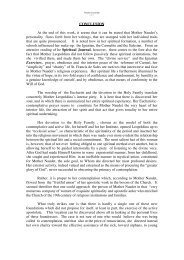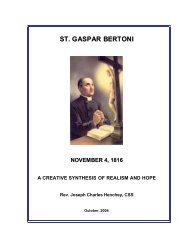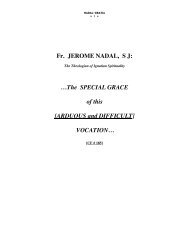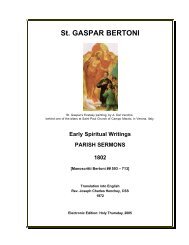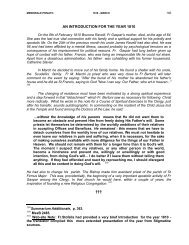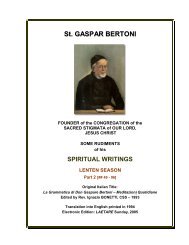[B.] St. IGNATIUS of LOYOLA Presentation: The ... - St. Gaspar Bertoni
[B.] St. IGNATIUS of LOYOLA Presentation: The ... - St. Gaspar Bertoni
[B.] St. IGNATIUS of LOYOLA Presentation: The ... - St. Gaspar Bertoni
You also want an ePaper? Increase the reach of your titles
YUMPU automatically turns print PDFs into web optimized ePapers that Google loves.
INTEGRE;SJ-OFM<br />
= 34 =<br />
[d.<br />
<strong>The</strong> Progressive Beatitudes: Mt 5:1, ff.]<br />
1830: As on a sublime mountain, the Savior and our Master has shown by the example in His<br />
own life, this mystery <strong>of</strong> perfection, He Who is the total splendor <strong>of</strong> perfection, the mirror and<br />
exemplar. Lk 6:40: But everyone shall be perfect, if he be as his master. Since He would teach<br />
His Apostles this perfection in accord with this significance, as in Mt 5:1, ff., He went up into the<br />
mountain, not addressing the imperfect crowds, but His own disciples, whom He had decreed to<br />
raise up to the height <strong>of</strong> perfection. And therefore, in a most ordered manner, He teaches them<br />
the eight Beatitudes:<br />
1831: 1. Blessed are the poor in spirit: He invites them to the perfect abdication <strong>of</strong><br />
temporal possessions.<br />
2. Blessed are the meek: He induces them to the denial <strong>of</strong> their own wills and<br />
senses, by which one becomes rude and impudent.<br />
3. Blessed are they that mourn: He encourages them to the perfect detestation <strong>of</strong><br />
the carnal desires.<br />
4.& 5. Blessed are they that hunger and thirst…the merciful: He attracts them<br />
toward the just and pious condescension and support toward one’s neighbors.<br />
6 &7: Blessed are the clean <strong>of</strong> heart…the peace-makers: He draws them to action<br />
that tends on high, to be limpid in intellect, tranquil and peaceful in affection, by which the soul <strong>of</strong><br />
the perfect man, is rendered in accord with Jerusalem, which is interpreted as the vision <strong>of</strong> peace.<br />
8. Concluding with: Blessed are they that suffer persecution for justice’ sake,<br />
for theirs is the kingdom <strong>of</strong> heaven. By so doing, He has made a complete circle, and returns<br />
to the first beatitude, for in this one last one, the summary <strong>of</strong> all <strong>of</strong> them is completed.<br />
1832: And through this, His seminal perfection <strong>of</strong> this small, representative world in the way <strong>of</strong><br />
reparation and grace, directly corresponds to the healthy production <strong>of</strong> the world machine in the<br />
way <strong>of</strong> nature. Hence, since those first three Beatitudes pertain to distinction, the following three<br />
are embellishment. And so in this, as by almost distinguishing the first three, the powers <strong>of</strong> the<br />
soul are separated from the totality <strong>of</strong> evils, that there might be a pure and distinct being; the<br />
three following are presented almost as ornamentation, and they lead souls toward God, that<br />
there might be had a decorous and embellished being. However, should one descend to each<br />
one <strong>of</strong> these Beatitudes, in which there is clearly manifested such marvelous correspondence,<br />
and the symbol <strong>of</strong> such similitude, that there could be said the same as is noted after the works<br />
<strong>of</strong> the six days <strong>of</strong> creation: Gn 2:1: in the soul <strong>of</strong> the perfect man it would seem that all is<br />
completed.<br />
On account <strong>of</strong> this, as in the place <strong>of</strong> the first three works, which are the foundations <strong>of</strong><br />
the universe, and then their completion in the three following days, the first three Beatitudes fall<br />
under vow: and the three following, pertain to desire.<br />
[4. <strong>The</strong> Example <strong>of</strong> Francis and His First Companions:]<br />
1833: <strong>The</strong> second part <strong>of</strong> perfection, therefore, consists in following by the way <strong>of</strong><br />
supererogatory works that good which, as far as the two-fold life, the active and contemplative,<br />
are concerned, and so is distinguished in two: <strong>The</strong> first in condescending toward one’s neighbor;<br />
and the second in elevating the mind toward God. Blessed are they that hunger and thirst<br />
after justice. Mt 5:6<br />
He preached with great fervor, and drew souls with the most gentle <strong>of</strong> manners. He<br />
began to conform himself to the apostolic life, rather to the life <strong>of</strong> our Lord, calling all to penance.<br />
1834: With his first companion, he opened the Gospel three times . <strong>The</strong> first time they read : If<br />
you wish to be perfect [Mt 19:21. <strong>The</strong> second time: you will bring nothing with you, only one<br />
tunic. Mt 10:9, ff. <strong>The</strong> third time: Whoever wishes to come after me Mt 16:24. Francis then


![[B.] St. IGNATIUS of LOYOLA Presentation: The ... - St. Gaspar Bertoni](https://img.yumpu.com/33393889/34/500x640/b-st-ignatius-of-loyola-presentation-the-st-gaspar-bertoni.jpg)
